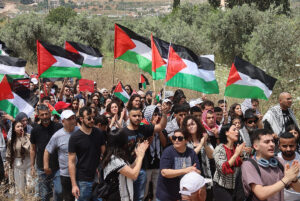‘The fourth generation remembers’: Nakba commemorated in shadow of Gaza war

Protesters wave Palestinian flags during the 27th annual March of Return in the depopulated villages of Hawsha and Al-Kasair, northern Israel, 14 May 2024
Baker Zoubi and Ghousoon Bisharat report in +972 on 14 May 2024:
In the shadow of what many Palestinians are describing as a second Nakba in Gaza, around 15,000 Palestinian citizens of Israel participated in the 27th annual March of Return on Tuesday. After gathering in the northern city of Shefa-Amr, participants marched to the site of Hawsha and Al-Kasair, Palestinian villages that were forcibly depopulated during the Nakba of 1948 and subsequently destroyed.
Although Nakba Day is officially marked on May 15, the March of Return is held every year on Israel’s Independence Day, under the slogan “Their independence is our Nakba.” In recent years, the march has become the central mobilizing event for Palestinian citizens of Israel, uniting all groups and political forces. It is organized by the Committee for the Defense of the Rights of the Internally Displaced Persons in Israel, which selects one of the more than 600 Palestinian localities uprooted by Zionist or Israeli militias in 1947-49 as the march’s destination.
The number of Palestinians who were expelled or forced to flee from their homes in those years and prevented from returning was around 750,000; the number displaced in Gaza since October 7 exceeds 1.9 million.
“Without a doubt, this year’s march is different from all its predecessors, although marches took place in the past under difficult circumstances for the Palestinian people,” said journalist and activist Makbula Nassar, a member of the organizing committee. “As we march to emphasize our commitment to the UN-recognized Right of Return, hundreds of thousands of Palestinians — the children and grandchildren of those displaced in 1948 — are living once again through mass displacement.”
Commemorating the Nakba under the present circumstances, Nassar explained, is “a real challenge, but we are not compromising on continuing our activity, which has been going on for years. Its value has grown in recent years as a unifying event that speaks to all members of Arab society, although this year, the accompanying feelings are much more difficult.”
